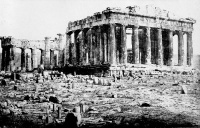Ancient Greek
From The Art and Popular Culture Encyclopedia
| Revision as of 21:23, 4 November 2008 Jahsonic (Talk | contribs) ← Previous diff |
Current revision Jahsonic (Talk | contribs) |
||
| Line 1: | Line 1: | ||
| + | [[Image:Western face of the Greek Parthenon.jpg|thumb|right|200px| | ||
| + | This page '''''{{PAGENAME}}''''' is part of the [[Ancient Greece]] series. | ||
| + | <br> | ||
| + | <small> | ||
| + | Photo: western face of the [[Parthenon]]</small>]] | ||
| {{Template}} | {{Template}} | ||
| - | :''[[Ancient Greece]]'' | + | |
| - | '''Ancient Greek''' refers to the second stage in the history of the [[Greek language]]. | + | '''Ancient Greek''' includes the forms of the [[Greek language]] used in [[ancient Greece]] and the [[classical antiquity|ancient world]] from around 1500 BC to 300 BC. It is often roughly divided into the following periods: [[Mycenaean Greek]] ({{c.|1400–1200 BC}}), [[Greek Dark Ages|Dark Ages]] ({{c.|1200–800 BC}}), the [[Archaic Greece|Archaic]] period ({{c.|800–500 BC}}), and the [[Classical Greece|Classical]] period ({{c.|500–300 BC}}). |
| + | |||
| + | Ancient Greek was the language of [[Homer]] and of [[fifth-century Athens|fifth-century Athenian]] historians, playwrights, and [[Ancient Greek philosophy|philosophers]]. It has contributed many words to English vocabulary and has been a standard subject of study in educational institutions of the [[Western world]] since the [[Renaissance]]. This article primarily contains information about the [[Homeric Greek|Epic]] and [[Classical Greece|Classical]] periods of the language. | ||
| + | |||
| + | From the Hellenistic period ({{c.|300 BC}}), Ancient Greek was followed by [[Koine Greek]], which is regarded as a separate historical stage, although its earliest form closely resembles [[Attic Greek]] and its latest form approaches [[Medieval Greek]]. There were several [[Ancient Greek dialects|regional dialects]] of Ancient Greek, of which Attic Greek developed into Koine. | ||
| + | |||
| + | ==See also== | ||
| + | * [[Ancient Greek dialects]] | ||
| + | * [[Ancient Greek grammar]] | ||
| + | * [[Ancient Greek accent]] | ||
| + | * [[Greek alphabet]] | ||
| + | * [[Greek diacritics]] | ||
| + | * [[Greek language]] | ||
| + | * [[Hellenic languages]] | ||
| + | * [[Katharevousa]] | ||
| + | * [[Koine Greek]] | ||
| + | * [[List of Greek and Latin roots in English]] | ||
| + | * [[List of Greek phrases]] (mostly ancient Greek) | ||
| + | * [[Medieval Greek]] | ||
| + | * [[Modern Greek]] | ||
| + | * [[Mycenaean Greek]] | ||
| + | * [[Proto-Greek language]] | ||
| + | * [[Varieties of Modern Greek]] | ||
| + | |||
| {{GFDL}} | {{GFDL}} | ||
Current revision
|
Related e |
|
Featured: |
Ancient Greek includes the forms of the Greek language used in ancient Greece and the ancient world from around 1500 BC to 300 BC. It is often roughly divided into the following periods: Mycenaean Greek (Template:C.), Dark Ages (Template:C.), the Archaic period (Template:C.), and the Classical period (Template:C.).
Ancient Greek was the language of Homer and of fifth-century Athenian historians, playwrights, and philosophers. It has contributed many words to English vocabulary and has been a standard subject of study in educational institutions of the Western world since the Renaissance. This article primarily contains information about the Epic and Classical periods of the language.
From the Hellenistic period (Template:C.), Ancient Greek was followed by Koine Greek, which is regarded as a separate historical stage, although its earliest form closely resembles Attic Greek and its latest form approaches Medieval Greek. There were several regional dialects of Ancient Greek, of which Attic Greek developed into Koine.
See also
- Ancient Greek dialects
- Ancient Greek grammar
- Ancient Greek accent
- Greek alphabet
- Greek diacritics
- Greek language
- Hellenic languages
- Katharevousa
- Koine Greek
- List of Greek and Latin roots in English
- List of Greek phrases (mostly ancient Greek)
- Medieval Greek
- Modern Greek
- Mycenaean Greek
- Proto-Greek language
- Varieties of Modern Greek


